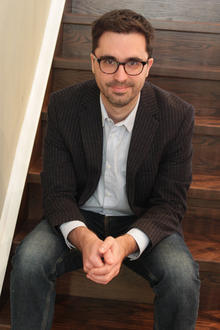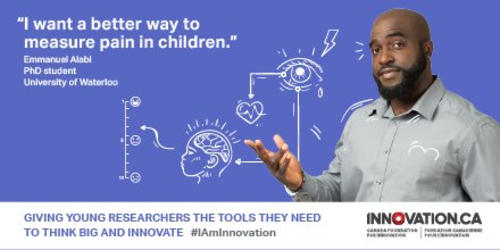The Daily Bulletin is published by Internal and Leadership Communications, part of University Communications
Contact us at bulletin@uwaterloo.ca
Submission guidelines
Editor:
Brandon Sweet
University Communications
bulletin@uwaterloo.ca
By Lisa Kabesh. This excerpt is the first of three Centre for Teaching Excellence Teaching Stories that will be featured in the Daily Bulletin this week.
 When asked about the role experiential education plays in his classes, quips, “I didn’t know there was another kind.” In the courses Robert Danisch teaches at Waterloo — Speech Writing, Small Group Communication, Persuasion, and Communication Ethics — practice is integral to student learning.
When asked about the role experiential education plays in his classes, quips, “I didn’t know there was another kind.” In the courses Robert Danisch teaches at Waterloo — Speech Writing, Small Group Communication, Persuasion, and Communication Ethics — practice is integral to student learning.
Danisch wryly summarizes how Humanities classes tend to work: read some stuff, talk about what was read, then write or talk about it in a more formal way. This, too, is the foundation of his classes, and Danisch establishes this expectation for his students early in his courses. To some outside of the Humanities, how experiential learning fits into this process might not be immediately evident. But as he tries to make clear to his students, everything is communication. Students are always “doing” communication in his classes, as they are in all of their classes.
Danisch seeks to make students aware of the ubiquity of communication and their role in it as active communicators. When he began teaching Small Group Communication at Waterloo in 2011, he brought to the course the unorthodox approach that he had employed when teaching a similar course at Concordia University: on the first day of class, he walked into the classroom and simply sat down. What happened next was up to the students. When Danisch paused the class some time later, he asked students to reflect on the toolkit of small group communication practices they had to resort to when his refusal to lead the discussion gave them no other option. The message was clear: we are all always practicing learned communication skills. Taking the time to reflect on those skills can help us to be more intentional about how we relate to and with others.
In this way, Danisch helps students develop as reflexive practitioners — as communicators capable of reflecting on their practices and making adjustments based on those reflections.
While daunting to some, this cycle of practice-feedback-reflection develops in learners not just a knowledge of theory, or what Danisch calls “know-that,” but an embodied knowledge embedded in practice, or “know-how.”
In his Speech Writing course, for example, students explore a rhetorical device like parallel structure (verbal elements or phrases that repeat to build rhythm, pattern, and meaning) in a speech that they write and deliver to the class. Students receive real-time feedback from Danisch and their peers; as he points out, this class is not for the faint-hearted. While daunting to some, this cycle of practice-feedback-reflection develops in learners not just a knowledge of theory, or what Danisch calls “know-that,” but an embodied knowledge embedded in practice, or “know-how.” It is this know-how that Danisch works to cultivate in students, and he attempts to do so by placing agency in the hands of learners.
Read the rest of the Teaching Story on the CTE website.

By Peter Stirling. This article was originally published on the School of Optometry and Vision Science website.
If you are travelling by plane in Canada, or through the train and bus terminals of Ottawa, you may spot the University of Waterloo logo and recognize one of our School of Optometry & Vision Science’s graduate student celebrities, Emmanual Alabi, on billboards and posters created by the Canada Foundation for Innovation (CFI). Alabi was chosen as one of eight researchers from across Canada who exemplify a curious, ambitious, innovative and collaborative approach to their work. Promoted under the #IAmInnovation hashtag, CFI also created a video to highlight Alabi’s research.
In 2017, Alabi received recognition after winning the University of Waterloo Three Minute Thesis (3MT) competition. Alabi’s research focuses on the observation of pupil response and blood flow as factors to measure an individual’s pain tolerance when stimuli are introduced to the surface of the eye. By characterizing these responses, Alabi and his colleagues hope to develop objective metrics to quantify how we experience pain.
Alabi attributes his passion for his current research to the support of his supervisor, Professor Trefford Simpson, who has been studying human ocular surface sensory processing for over twenty years now. Sponsored largely through funding from the Natural Sciences and Engineering Research Council of Canada (NSERC), Simpson and his team of researchers are studying the sensory spectrum of the surface of the eye.
Beyond Alabi's research on the local effect of pain to the eye, another of Simpson’s students, Varadhu Jayakumar, is considering how stimuli affects the way we cognitively accommodate that sensation. What influence does a psychological response such as anxiety have on our experience of mildly painful or cold stimuli? And beyond how we interpret the sensation, does the language we use capture the feeling?
“Very few people are working on the basic sensory mechanisms of how our eye feels, and what enables that feeling. We still know so little, and there are many opportunities for new directions. It is immensely satisfying to work with graduate students whose experiments are opening new windows to our understanding of the complexity of the sensory process.”
Alabi and Simpson were in Ottawa on February 12 to discuss their research with Members of Parliament, Senators, and representatives from NSERC/SSHRC.
If you happen to snap a selfie with a CFI billboard of Alabi, please tag us! @UwOptometry @InnovationCA #IAmInnovation
Reading Week, Tuesday, February 20 to Friday, February 23.
Retail Services Staff and Faculty Appreciation week, Tuesday, February 20 to Friday, February 23.
Machine Learning: Applications to Metal Clusters and Chemistry, Thursday, February 22, 2:30 p.m., PHY 313.
Writing Centre presents Fundamental of writing your thesis, Thursday, February 22, 9:00 a.m. to 4:00 p.m.
WISE Public Lecture, “Reducing Carbon Emissions Through Energy”, Thursday, February 22, 10:30 a.m., CPH 4335.
University Club Chinese New Year Luncheon, Tuesday, February 20 to Friday, February 23, 11:30 a.m. to 2:00 p.m., University Club.
Master of Business, Entrepreneurship and Technology (MBET) Information Session, Wednesday, February 21 10:30 a.m., Online Webinar.
Master of Digital Experience Innovation online information session, Wednesday, February 21, 12:00 p.m. to 1:00 pm, Facebook Live session.
Weight Watchers: new members are invited to join the Weight Watchers At Work Series, Wednesday, February 21, 12:00 p.m. to 1:00 p.m., PAS 2085. Contact tgneal@uwaterloo.ca for details.
PhD seminar, “Nonsmooth Frank-Wolfe with uniform affine approximations,” Edward Cheung, David R. Cheriton School of Computer Science, Wednesday, February 21, 3:00 p.m., DC 2102.
WaterTalk: Aquatic Methane at Small and Large Scales, Thursday, February 22, 2:30 p.m., DC 1302.
Joint Seminar presented by WatRISQ, University of Waterloo and IEOR, Columbia University, "New Ideas for Credit Portfolio Management," Thursday, February 22, Manhattan Institute of Management, 110 William Street, New York.
Grade 10 Family Night, Thursday, February 22, 6:30 p.m. to 8:30 p.m.
Entangled: The Series - QUANTUM + Logic, Thursday, February 22, 7:00 p.m., QNC 0101.
NEW - PhD seminar featuring Caitlin Scott, School of Environment, Resources and Design, “The ‘Scientization’ of Sustainable Junk Food,” Monday, February 26, 12:00 p.m., EV1-354.
University Senate meeting, Monday, February 26, 3:30 p.m., NH 3407.
Copyright for Teaching workshop, Tuesday, February 27, 12:00 p.m., DC 1568.
WICI Talk - Dr. Carla Restrepo: From sandpiles to real mountains - Complex dynamics of tropical mountainscapes mediated by landslides, Tuesday, February 27, 2:00 p.m., DC 1302.
Heart-Healthy Eating (Waterloo Women's Wednesdays), Wednesday, February 28, 12:00 p.m. to 1:30 p.m., MC 5479.
Noon Hour Concert: Sunabacka: Louis Riel’s Dream, Wednesday, February 28, 12:30 p.m., Conrad Grebel University College Chapel.
Bridges Lecture Series, “Beyond the Imitation Game – From Dieppe & James Bond to Blackberry and Quantum Encryption,” featuring Lecturers Peter Berg and David O’Keefe, Wednesday, February 28, 7:30 p.m., St. Jerome’s University, Academic Centre Vanstone Lecture Hall. Register in advance at www.sju.ca/bridges.
Velocity Start: How To Find Your Customers Online, “Conduct online market research,” Wednesday, February 28, 7:30 p.m., Velocity Start, SCH 2nd Floor.
QPR Training, Thursday, March 1, 10:30 a.m., Counselling Services, Needles Hall Second Floor.
Communication for the Workplace, Thursday, March 1, 1:00 p.m.
CBB Seed Funding Grant Applications close, Thursday, March, 1, 4:30 p.m., Centre for Bioengineering and Biotechnology (EC4 2001).
Free screening of 'Sea of Life' Documentary, Thursday, March 1, 6:30 p.m.
World’s Challenge Challenge competition, “Student teams propose solutions to major global problems,” Thursday, March 1, 2018, 7:00 p.m., Location TBD.
Athletics Football Gala, Friday, March 2, 5:45 p.m., Bingemans ballroom, Bingemans.
Recreation and Leisure Studies. Hugh Simmonds, "Curating the Cinematic Muse: The Role of Programming in the Film Festival Experience - A Case Study of the 40th Toronto International Film Festival." Supervisor, Stephen Smith. On display in the Faculty of Applied Health Sciences, BMH 3110. Oral defence Friday, March 9, 2:00 p.m., AHS 1686.
Mechanical & Mechatronics Engineering. Farzad Liravi, "Additive Manufacturing of Soft Polysiloxane-based Bio-Structures with Heterogeneous Properties." Supervisor, Ehsan Toyserkani. This thesis is restricted but on display in the Engineering graduate office, DWE 3520C. Oral defence Monday, March 12, 1:30 p.m., E5 3052.
Systems Design Engineering. Champika Samarasekera, "Variations on Acoustophoretic Microchannels: From the Facile to the Highly Capable." Supervisor, John Yeow. On display in the Engineering graduate office, DWE 3520C. Oral defence Wednesday, March 14, 10:30 a.m., EC4-2031.
The Daily Bulletin is published by Internal and Leadership Communications, part of University Communications
Contact us at bulletin@uwaterloo.ca
Submission guidelines
The University of Waterloo acknowledges that much of our work takes place on the traditional territory of the Neutral, Anishinaabeg, and Haudenosaunee peoples. Our main campus is situated on the Haldimand Tract, the land granted to the Six Nations that includes six miles on each side of the Grand River. Our active work toward reconciliation takes place across our campuses through research, learning, teaching, and community building, and is co-ordinated within the Office of Indigenous Relations.